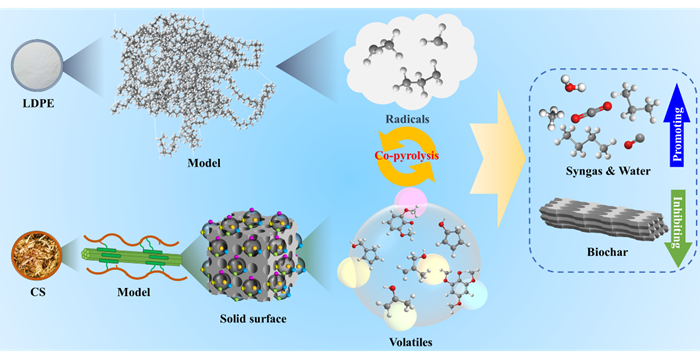Study reveals how functional groups on solid matrix vary during co-pyrolysis of corn straw and low-density polyethylene
Recently, the Clean Conversion and High-value Utilization of Farming Waste Team at the Institute of Environment and Sustainable Development in Agriculture (IEDA), Chinese Academy of Agricultural Sciences (CAAS) revealed the paths of variations in the functional groups on solid matrix during the co-pyrolysis of corn straw (CS) and low-density polyethylene (LDPE). The related findings have been published in the Chemical Engineering Journal .
It is difficult to recycle and utilize CS as it is often mixed with mulch film, causing serious pollution to the environment. Co-pyrolysis can turn them into clean biochar, pyrolysis gas and bio-oil; however, the uncertainty in how the functional groups on solid matrix vary during the co-pyrolysis of CS and LDPE makes it difficult to develop an effective control strategy.
Based on in-situ FTIR spectroscopy, as well as cutting-edge technologies such as thermogravimetric-infrared-mass spectrometry (TG-FTIR-MS) and electron paramagnetic resonance (EPR), the research team analyzed the paths of variations in five typical functional groups (OH, C-O, C="O," C="C," and C-H) on solid matrix during pyrolysis/co-pyrolysis. The results indicated that co-pyrolysis promoted the generation of H2, CH4, CO, CO2, clarified the rules by which LDPE affected the reactions of functional groups on solid matrix, and revealed the biochar formation mechanism during co-pyrolysis, providing theoretical support for controlling and recycling agricultural waste through co-pyrolysis.

Doctoral student Xie Teng with the IEDA, CAAS is the first author of this paper, and Researcher Zhao Lixin is the corresponding author. This research was supported by China Agriculture Research System and the National Key Research and Development Program (2022YFD2002100).
Linkage:https://doi.org/10.1016/j.cej.2024.149166
-
 Apr 18, 2024Opening Ceremony of the Training Workshop on Wheat Head Scab Resistance Breeding and Pest Control in Africa Held in CAAS
Apr 18, 2024Opening Ceremony of the Training Workshop on Wheat Head Scab Resistance Breeding and Pest Control in Africa Held in CAAS -
 Apr 03, 2024IPPCAAS Co-organized the Training Workshop on Management and Application of Biopesticides in Nepal
Apr 03, 2024IPPCAAS Co-organized the Training Workshop on Management and Application of Biopesticides in Nepal -
 Mar 28, 2024Delegation from the School of Agriculture and Food Science of University College Dublin, Ireland Visit to IAS, CAAS
Mar 28, 2024Delegation from the School of Agriculture and Food Science of University College Dublin, Ireland Visit to IAS, CAAS -
 Mar 25, 2024Director of World Food Prize Foundation visited GSCAAS
Mar 25, 2024Director of World Food Prize Foundation visited GSCAAS -
 Mar 20, 2024Institute of Crop Sciences (ICS) and Syngenta Group Global Seeds Advance Collaborative Research in the Seed Industry
Mar 20, 2024Institute of Crop Sciences (ICS) and Syngenta Group Global Seeds Advance Collaborative Research in the Seed Industry
